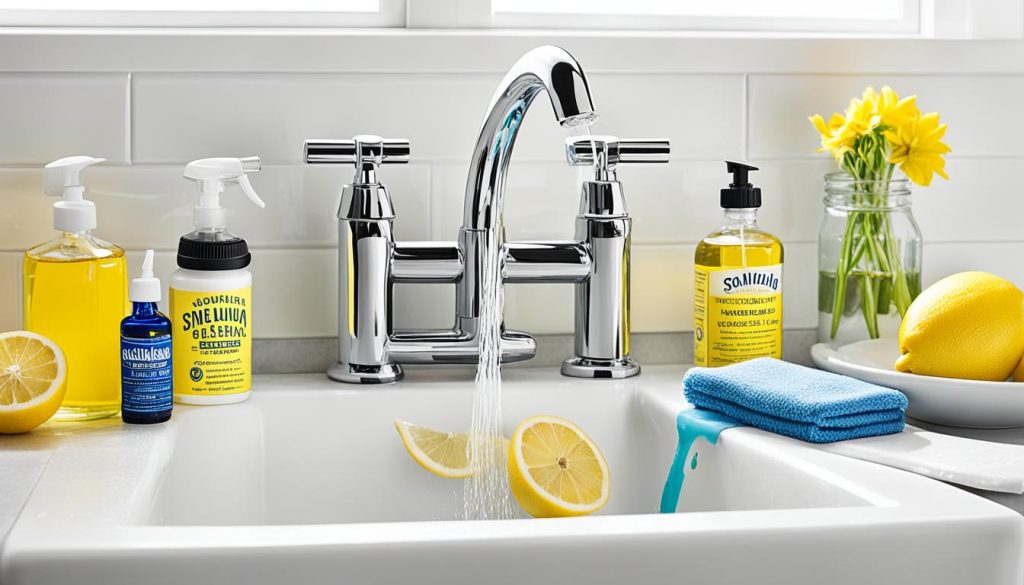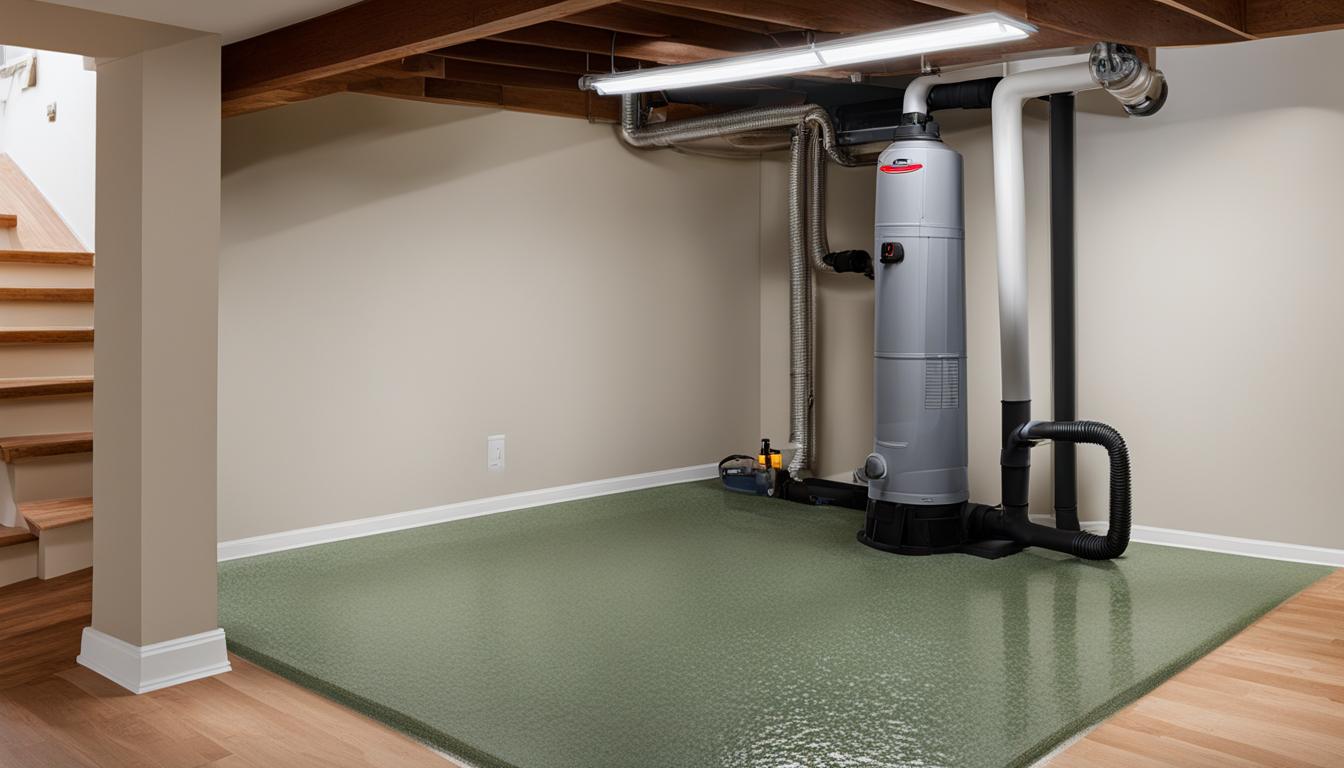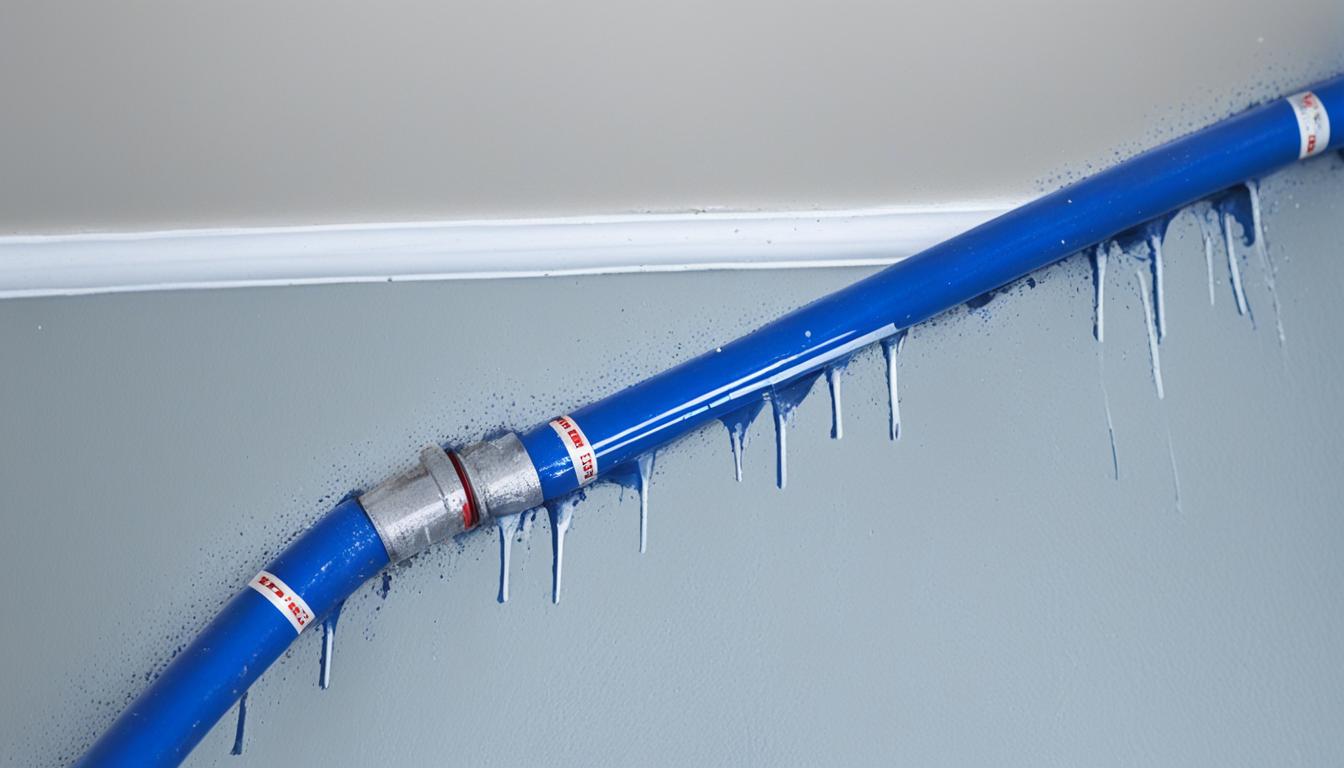Solving Drains Smell Bad: Quick Home Fixes
Did you know that the foul odor from drains can make your home uncomfortable and impact your daily life? Whether it’s a stinky kitchen sink or a bathroom drain with an unpleasant scent, dealing with drain odor is a common issue that many homeowners face. Understanding the causes and finding effective solutions is key to freshening up your drains and restoring a pleasant environment in your home.
Key Takeaways:
- Drain odor can be caused by various factors such as food particles, bacterial growth, evaporation of water, congealed grease, and clogs.
- Cleaning the sink, removing debris, running hot water and dish soap, and using a plunger are some DIY solutions for eliminating drain odor.
- Preventive measures like regular maintenance, avoiding clog-causing items, and keeping drains clear can help prevent future odor problems.
- Professional drain cleaning services can effectively tackle stubborn drain odor and provide tailored solutions for your drainage system.
- Regular maintenance and preventive measures are essential for maintaining odor-free drains in your home.
Causes of Smelly Drains
Drain odors can be unpleasant and disruptive to the comfort of your home. To effectively address the problem, it’s important to understand the common causes of smelly drains. By identifying the specific sources of the odor, you can take the necessary steps to eliminate the foul smell and restore freshness to your drainage system.
Kitchen Sink
Food particles and debris that get stuck in the kitchen sink can lead to bacterial growth, resulting in unpleasant odors. This can happen when leftover food scraps are washed down the drain or when the garbage disposal unit accumulates rotting food. Additionally, dumping grease and oil down the sink can congeal and decompose in the pipes, causing foul smells.
Bathroom Drains
In the bathroom, hair, soap scum, and other debris can accumulate in the drains over time. This buildup can create clogs and contribute to the development of unpleasant drain scents. It’s important to regularly clean the bathroom sink and remove any debris from the drain to prevent odor-causing substances from accumulating.
Water Evaporation
Unused drains, especially in sinks or showers that are infrequently used, can allow water to evaporate over time. When the water in the drain trap (P-trap) evaporates, odorous gases from the sewer system can escape into your home. This can result in unpleasant sewer smells emanating from the drain.
To effectively tackle drain odor problems, it’s important to identify the specific source of the smell. This will enable you to take targeted measures to eliminate the odor and keep your drains fresh and odor-free.
Solutions for Smelly Drains
If you’re dealing with unpleasant odors coming from your drains, there are several DIY solutions you can try to eliminate the odor and freshen up your drains. Here are some tips:
Cleaning the Kitchen Sink
Start by cleaning the sink itself. Remove any food particles or debris from the drain or garbage disposal. Running hot water and dish soap down the drain can help break down grease and eliminate foul odors. Avoid using harsh chemical cleaners as they can potentially damage your pipes.
Tackling Bathroom Drains
In the bathroom, cleaning the sink thoroughly is crucial. Remove hair and soap scum from the drain using a drain snake or brush. If you’re dealing with a clog, try using a plunger to dislodge the blockage. This can help eliminate unpleasant smells that come from trapped debris in the drain.
Ensuring P-Trap Water
The P-trap, the U-shaped pipe beneath sinks, is designed to hold water and prevent sewer gases from entering your home. Make sure the P-trap contains water by periodically running water in unused sinks. This simple step can significantly reduce drain odor.
Regular Maintenance and Preventive Measures
To prevent future drain odor problems, it’s important to keep your drains clear and avoid dumping grease and other clog-causing items down the sink. Running hot water and dish soap through your drains regularly can help break down buildup and keep them fresh. Performing these preventive measures can save you from dealing with foul-smelling drains in the future.
By following these DIY solutions and implementing proper maintenance practices, you can effectively get rid of drain odor and enjoy fresh-smelling drains in your home.
Professional Drain Cleaning Services
If DIY methods don’t solve the persistent drain odor issue, it may be necessary to seek professional help. Professional drain cleaning services can effectively remove grime, residue, and odor-causing substances from the drain lines. They have the expertise and equipment to tackle stubborn drain problems and ensure that your drains are clean and odor-free. Calling a plumber is recommended if the odor persists or if there are signs of a more serious issue, such as a blockage in the sewer line. A professional plumber can provide a thorough assessment and offer solutions tailored to your specific drainage system.
When it comes to drain cleaning services, relying on professional plumbers is essential for long-lasting results. These experts have the knowledge and tools to address even the most stubborn drain odor. Whether it’s a foul smell coming from your kitchen sink or a persistent sewer odor in the bathroom, professional plumbers can efficiently diagnose and resolve the problem.
Unlike DIY methods that may temporarily mask the odor, professional drain cleaning services target the root cause of the issue. They use specialized techniques like hydro-jetting to remove buildup and debris from the drain lines, ensuring a thoroughly clean and odor-free system.
One of the advantages of hiring professional plumbers for drain cleaning is their ability to tackle stubborn drain odor. Sometimes, DIY solutions simply don’t cut it, especially when the problem is deep-rooted or requires complex repairs. Professional plumbers have the experience and expertise to identify underlying issues, such as damaged pipes or a malfunctioning sewer line, and provide effective solutions.
When to Call a Plumber for Drain Problems
If you’re experiencing persistent drain odor, it’s a good idea to call a plumber. They can assess the situation and determine whether there’s a more serious issue at hand. Here are some signs that indicate it’s time to seek professional help:
- Recurring or persistent drain odor that doesn’t go away with DIY methods
- Slow-draining or completely clogged drains
- Blocked sewer line causing backups and foul smells
- Unusual gurgling or bubbling sounds coming from the drains
- Water pooling around drains or unusual dampness in the surrounding areas
- Visible signs of damage or deterioration in the plumbing system
| Signs It’s Time to Call a Plumber for Drain Problems | Description |
|---|---|
| Recurring or persistent drain odor | DIY methods haven’t resolved the issue |
| Slow-draining or completely clogged drains | Water takes a long time to drain or doesn’t drain at all |
| Blocked sewer line | Backups and foul smells in multiple drains |
| Unusual sounds from drains | Gurgling or bubbling noises when using sinks or toilets |
| Water pooling or dampness | Excess water around drains or wet areas near plumbing fixtures |
| Visible damage in the plumbing system | Cracks, leaks, or corrosion in pipes or fixtures |
Preventing Drain Odor
Regular maintenance and routine drain maintenance are crucial in keeping your drains clean and fresh, effectively preventing drain odor. By incorporating a few simple tips into your household routine, you can maintain odor-free drains and avoid future unpleasant smells.
To start, make sure to scrape off any leftover food from dishes before using the dishwasher. This helps prevent clogs that can lead to foul odors. Additionally, avoid dumping grease, eggshells, and stringy vegetables down the kitchen sink, as they can cause buildup and blockages.
When it comes to bathroom drains, using drain protectors can be highly effective in preventing hair and debris from collecting in the drain. Regularly cleaning the drain and removing any soap scum or buildup can also go a long way in maintaining fresh-smelling drains. Remember to run the disposal and faucet for at least 20 seconds per use to keep everything flowing smoothly.
Other preventive measures include regularly pouring boiling water down all your drains to dissolve any buildup, ensuring that the P-trap is properly installed to prevent sewer gases from entering your home, and periodically running water in unused sinks to keep the P-trap filled. Lastly, using natural odor control methods like citrus peels or fresh-smelling air fresheners can add an extra touch of freshness to your drains.
- Investing Wisely: How Windows & Doors in Boost Property Value and Financial Health - April 24, 2025
- The Financial Impact of Personal Injuries: Why Legal Help Matters for Business Owners - April 16, 2025
- The Hidden Financial Costs of Domestic Assault: What Business Owners Need to Know - April 16, 2025













